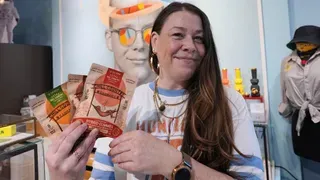September 2, 2010
UK's Foreign Secretary Denies Gay Rumors
Kilian Melloy READ TIME: 6 MIN.
Britain's foreign secretary spoke out to say that he and his wife had "had enough" with speculations that he and a male aide were involved in an improper relationship, the New York Times reported Sept. 2.
William Hague, 49, found himself the focus of tabloid and Internet speculation following the publication of photos of himself together with a younger man, aide Christopher Myers, 25. The accounts reported that while on the campaign trail last spring, Hague and Myers had shared hotel accommodations.
But the sharing of hotel rooms was all about work, Hague said. "This speculation seems to stem from the fact that whilst campaigning before the election we occasionally shared twin hotel rooms. Neither of us would have done so if we had thought that it in any way meant or implied something else," Hague told the press on Sept. 2.
Rumor had it that Hague's marriage was foundering, but Hague denied this as well. He noted that it was true that he and his wife had endured several miscarriages, but told journalists that they had only grown closer as a result. "My wife and I really felt we'd had enough of the circulation of untrue allegations, particularly on the Internet, and at some point you have to speak out about that and put the record straight," Hague said.
Hague also quashed stories to the effect that Myers had won his position not because he was qualified, but because he was Hague's paramour. "Any suggestion that his appointment was due to an improper relationship between us is utterly false, as is any suggestion that I have ever been involved in a relationship with any man," stated Hague. Myers resigned as Hague's aide on Sept. 1, the article said.
The rumors concerning Hague came in the wake of two recent revelations regarding members of Britain's coalition government. Less than a month after the new government came to power, then-Secretary to the Treasury, David Laws, stepped down, following revelations that he had submitted rent expenses for reimbursement even though his landlord was his male life partner, lobbyist James Lundie.
Laws had been in the closet before the revelations broke, and he explained that he was not seeking to defraud the government, but rather to keep his relationship private. However, submitting his rent expenses for reimbursement was a violation of policies prohibiting payments for such expenses when the money goes to a government employee's business partner, spouse, or significant other.
UK newspaper The Times reported on May 30 that Laws' career had been without blemish until the scandal broke. But while Laws' career--and the fledgling coalition government--had sustained a blow, Law faced even deeper distress in his personal life, having hidden his true sexuality for so many years. "When I grew up, being gay was not accepted by most people, including many of my friends," said Laws. "So I have kept this secret from everyone I know for every day of my life. I was so determined to keep my sexuality a secret that James and I behaved as if we were just good friends."
The couple had been living together since 2004, the Times said, and Law had been renting rooms from Lundie.
On Aug. 27, prison minister Crispin Blunt, 50, came out as gay and announced that he and his wife had separated. According to an Aug. 30 article in UK newspaper the Daily Mail, Blunt had earlier taken anti-gay stances, including making a statement that being gay is '"not equivalent to heterosexuality," adding that, "'It is also clear that there is a much greater strand of homosexuality than of heterosexuality which depends for its gratification on the exploitation of youth."
The article also said that Blunt decided to come out after Laws disclosed the truth about his own sexuality, an admission that did not lead to any official criticism of Laws for being gay.
Indeed, the issue of gays in government seems to be a non-issue in the UK, and Britain's GLBTs seem to be winning greater acceptance. While campaigning, Tory leader David Cameron--now the British Prime Minister--embraced GLBT voters, cultivating an image of greater inclusivity and to reaching out to conservative youth. Under Cameron's leadership, the Tory party--which had in the past taken anti-gay stances--reinvented itself as a modern and inclusive entity. As part of that effort, the Tories faced up to a checkered past of anti-gay laws, such as the notorious Section 28, a Thatcher-era law that banned any use of government funds to offer supportive discussions of gays or their families in classrooms. The law referred to gay and lesbian families as "pretend" families, and exerted a chilling effect in British schools when it came to discussions of GLBT issues.
Cameron went so far as to apologize for Section 28 last summer, saying that the Tories had "got it wrong," and contrasting the party as it once was with its more modern incarnation. "If five years ago we had a Conservative and Gay Pride party," Cameron said, "I don't think many gay people would have come or many Conservatives would have come."
Cameron went to far as to envision Britain's first openly gay Prime Minister, predicting that he or she might well hail from the ranks of the conservative party rather than emerging from Labor. "The Conservatives had the first woman prime minister," noted Cameron, adding, "we are bound to have the first black prime minister and the first gay prime minister."
But in a kind of "October surprise" for the Tories, the British media reported last April that a prominent Tory politician, Shadow Home Secretary Chris Grayling, had suggesting at a meeting that owners of Bed and Breakfast-style inns should be allowed under law to turn gay families away and refuse them lodging. "I think we need to allow people to have their own consciences," Grayling commented. "I personally always took the view that, if you look at the case of should a Christian hotel owner have the right to exclude a gay couple from a hotel, I took the view that if it's a question of somebody who's doing a B&B in their own home, that individual should have the right to decide who does and who doesn't come into their own home."
Just such a case had come up a few weeks previous to the news on Grayling's remarks, when a gay couple--who had paid in advance for a room reserved at a B&B--arrived at the establishment, only for the proprietor to deny them lodging based on the fact that they were two men. Susanne Wilkinson, owner of the Swiss B&B, reportedly told Michael Black and his partner John Morgan last March 19 that it was "against her convictions" to allow the men to share a room and refused them accommodations--even though Britain's anti-discrimination laws forbid denial of goods and services based on sexual orientation.
Grayling made the remarks at a meeting of a think tank called The Center for Policy Studies. He was unaware that his remarks were being recorded. Grayling went on to say that such rights to deny lodging should only be allowed in cases where the owners were offering accommodations in their own residence. "If they are running a hotel on [Main Street], I really don't think that it is right in this day and age that a gay couple should walk into a hotel and be turned away because they are a gay couple, and I think that is where the dividing line comes," said Grayling.
But Grayling's opinion could prove "very alarming to a lot of gay people who may have been thinking of voting Conservative," said the head of British GLBT advocacy group Stonewall Ben Summerskill. "The legal position is perfectly clear. If you are going to offer the public a commercial service--and B&Bs are a commercial service--then people cannot be refused that service on the grounds of sexuality." Added Summerskill, "No one is obliged to run a B&B, but people who do so have to obey the law. I don't think anyone, including the Tories, wants to go back to the days where there is a sign outside saying: 'No gays, no blacks, no Irish.' "
Another scandal emerged shortly after Grayling's remarks made headlines, when a defense spokesperson wrote in a letter that he opposed a bill that would equalize the age of consent for gay sex to 16, which is the age of consent for heterosexuals. "I was strongly against lowering the age of consent from 18 to 16," wrote Julian Lewis. "My reasoning was that there is a seriously increased risk of HIV infection arising from male homosexual activity.
"When it comes to legalizing practices that involve serious physical risk, I believe the higher limit should apply," continued Lewis. "This is the reason why we no longer allow 16- and 17-year-olds into front-line situations in the Armed Forces, for example.
"On the other hand (though no-one seems to have noticed), I voted in favor of the civil partnerships bill," Lewis pointed out. "One of the criticisms commonly made of gay relationships is that very often they do not last. It therefore seems obvious to me that, when a gay couple wish to commit to each other, by forming a permanent relationship, they should be encouraged and assisted in every way."
Cameron said that he backs Hague "100 percent," the Times reported.
Kilian Melloy serves as EDGE Media Network's Associate Arts Editor and Staff Contributor. His professional memberships include the National Lesbian & Gay Journalists Association, the Boston Online Film Critics Association, The Gay and Lesbian Entertainment Critics Association, and the Boston Theater Critics Association's Elliot Norton Awards Committee.







